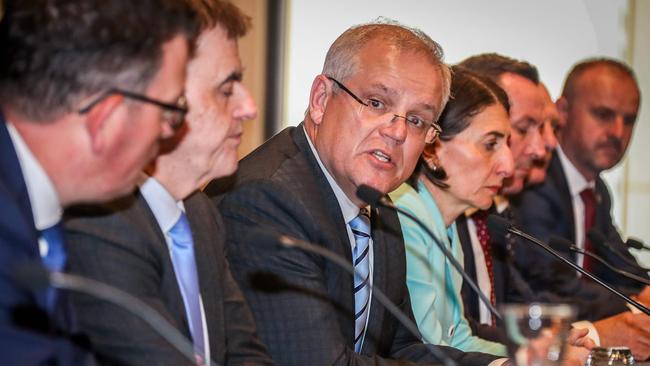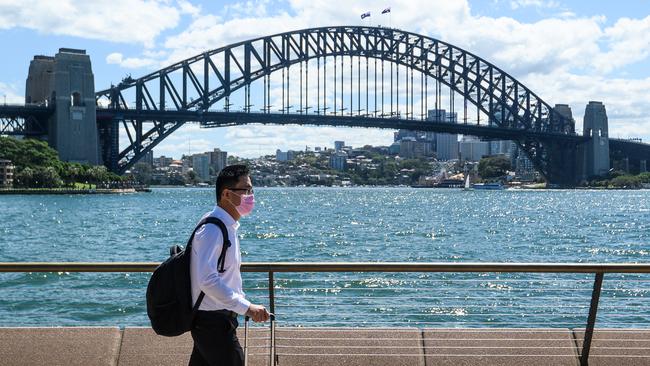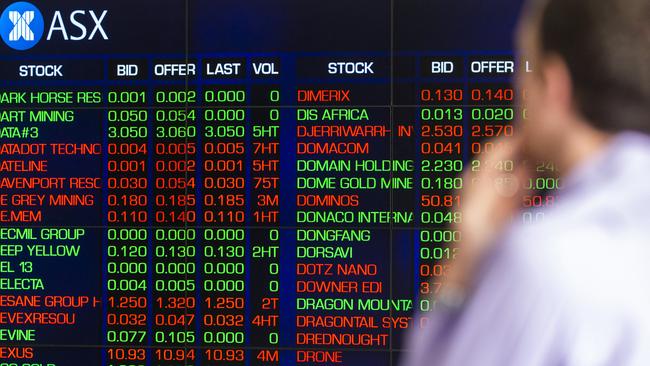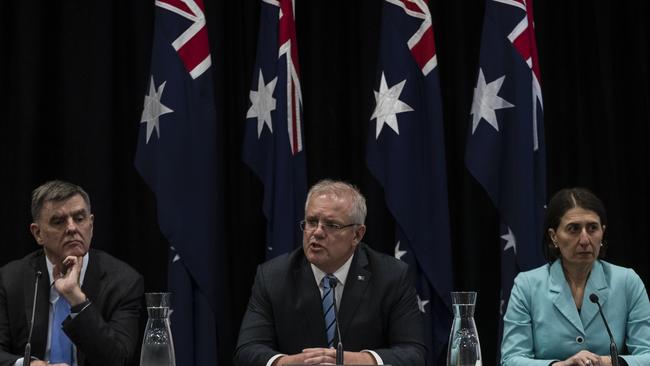Next COVID-19 challenge is our psychological preparedness
Rather than panic over ramped coronavirus measures, we should be stiffening our collective national spine and realising that none of this is new, it’s just new to us, writes Peta Credlin.
Rendezview
Don't miss out on the headlines from Rendezview. Followed categories will be added to My News.
It was a historic move by the Prime Minister on Friday to set up a new National Cabinet Committee to manage the coronavirus crisis.
It’s never been done before but these are extraordinary times, and by taking the upper hand to deal with an issue where Australians look to him to lead, but where, like bushfires, most of the delivery levers are in the hands of the premiers, Scott Morrison has learnt from the summer fire season and he’s leaving nothing to chance to get Australia’s coronavirus response right.
This new committee – made up of the PM, state premiers and territory chief ministers – will be established with all the rules and processes of federal cabinet. That’s important because one of the issues with information sharing has been the varying levels (or not) of confidential processes in our state bureaucracies.
It reduces the opportunity that some premiers might try and play politics, as happened over summer, by claiming they didn’t get this or that bit of information. There’s no chance now; they’re all in the room, collectively bound by decisions and even more than that, collectively bound to make good on any commitments.

In the end, governments can only do so much. They can advise, but we have to take that advice. And in coping with this pandemic, how we act – both in a health and economic sense – will be the real determinant in how much damage coronavirus will inflict on Australia.
For so many Australians alive today, disease, and indeed economic downturns, are unknown. If you’re under the age of 40, the AIDS crisis of a few decades back is folklore, so too is a recession, let alone what our grandparents and great-grandparents lived through. Back then, the Great Depression and war hit the economy hard and disease wasn’t abstract: measles, tuberculosis, typhus, smallpox and cholera all wiped out family members and in a pre-penicillin age, even a cut could kill.
Back then, death was our regular companion – not something that happened mostly to very old people in nursing homes. When the Spanish flu pandemic hit, not only had Australia just emerged from the Great War, where fully half of males between 18 and 40 had enlisted and more than 10 per cent of them been killed, but women still routinely died in childbirth, children still routinely died of infectious diseases, industrial accidents were commonplace, and both cancer and heart disease were invariably fatal.

Yet despite all the advances in medicine and all the benefits of prosperity, we humans are still vulnerable to new infectious diseases: think AIDS, ebola, and various new strains of flu, of which coronavirus is just the latest.
The difference between us and our forebears is our attitude to mortality. Death scares us more than it did them. Unlike them, we largely lack the religious faith that makes death a new beginning rather than a final end; and thanks to health advances, we think that death is something that we shouldn’t have to face until we’re very old.
Coronavirus is a threat to much that modern Australians take for granted. There are travel bans, large sporting events will be cancelled, and restaurants are half-empty, and supermarket shelves too. Rather than panic, as we’ve seen in recent works (or worse, brawl over toilet paper), we should be stiffening our collective national spine and realise this isn’t new, it’s just new to us.

Back in 1919, as Spanish flu infections ramped up in Sydney, the NSW government closed schools, churches, dances and libraries, and required everyone to wear a mask in public places. Sporting events and even the Easter Show, like in 2020, were cancelled. People who were mildly sick were required to stay home and special hospitals were set up for the seriously ill. And when NSW closed its borders with Victoria and Queensland, an interstate war of words broke out, making a bad situation worse (and clearly the PM knows his history here too hence getting premiers in under the one tent is smart).
The brutal reality is that however good our health preparations might be, we are not psychologically well prepared for a disease that might infect at least a quarter of the entire population and kill a significant percentage of us. Spanish flu is thought to have infected over a quarter of the world’s population and to have killed between three and ten per cent of those who became sick. Of Australia’s then population of 5 million, about 20,000 are thought to have died (one of the world’s lowest death rates). Part of the devastation of Spanish flu was its particular virulence among young, otherwise healthy people. Coronavirus, so far, has conformed to the usual flu pattern with a 20 per death rate for people over 80, a near 10 per cent death rate for people with other serious health problems and a near-zero death rate for people who are otherwise young and healthy.

The World Health Organisation’s most recent coronavirus update puts the overall mortality rate at between 3 and 4 per cent. Our Chief Medical Officer, Professor Brendan Murphy, has said that it “seems reasonable” to assume a case fatality rate in Australia of “around 1 per cent” and leading immunologists have surmised that upwards of 20 per cent of Australians could be infected. One per cent of 20 per cent doesn’t sound like a catastrophe (especially if it’s mostly among the very old) but that’s still 5 million people getting sick and 50,000 dying here in Australia. That’s quite a jump in the 8 million who currently present to our public hospitals every year and the 160,000 deaths annually that we could normally expect.
It’s good that our government is acutely conscious of the economic hit the virtual cessation of non-essential activity will entail – with a $18 billion stimulus package designed to boost investment, keep businesses afloat, protect jobs and encourage spending – but it’s hard to see a recession being avoided, particularly if we panic.
How will we cope with this adversity? Well, we’ll know soon enough. One way or another, this won’t just test the resilience of our economy, the strength of our health system and the efficiency of our government. All of us are likely to face unexpected tests of our character in coming months.
Originally published as Next COVID-19 challenge is our psychological preparedness



